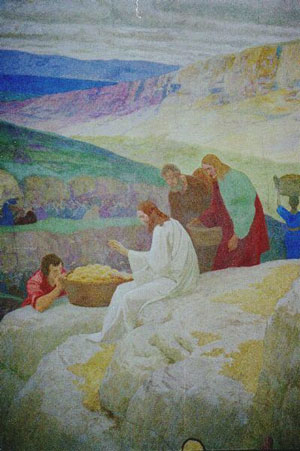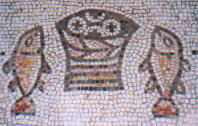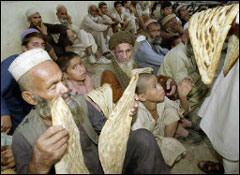|










|
|
- A picnic
Story of the multiplication of
the loaves: Mathew: 14, 13-21,
- Mark: 6, 30-44 Luke: 9, 10-17,
John: 6, 1-13.

|
When Jesus feeds people, he does it plentifully; the account
of the multiplication of loaves is a good example of it. The
four Evangelists with some variations report the event; it has
impressed the disciples of Jesus and indeed all who benefited
of this generous manna. |
Mark and Luke placed the event after the return of the Apostles
from their first mission in the villages of Galilee. They are
happy but rather tired. Then Jesus said to them "come
apart into a desert place, and rest a while" The Apostles
and Jesus crossed over the Sea of Galilee and went to an inhabited
but pleasant place: the grass was fresh, it was spring time close
to Easter according to John (6, 4 and 10). Everything was fine
for a resting time.
But the crowd had guessed where the small group was going, walking
around the lake, they arrived before the holyday-makers, so that
Jesus had to face thousands of people "who were as sheep
not having a shepherd "To not deceive the Apostles,
the Master could have said, let us stay alone for a rest, but
no, his heart spoke first "moved with compassion, he
welcome them and he began to teach them of the Kingdom of God
and healed them that had need of healing "Luke 9,11.
Why ask more? The crowd was happy but hungry! Jesus did not forget
that, him who cares for the body as much as for the soul. The
disciples in the contrary looked sour, because the nice rest
has gone, they insisted: "send them away, the day is
spent, let them go in the nearest villages and buy themselves
some thing to eat" Jesus' answer was a surprise: "Give
you them to eat "

|
"We have no more but five loaves and two fishes…except
we should go and buy food for all these people " Luke
9,13. |
-
- One can imagine their confused and even annoyed expression.
John noted that these fishes and loaves were coming from the
basket of a child; an unexpected gift from somebody who is not
considered important by the society of his time "without
counting women and children" was saying Mathew.
Jesus wanted to reassure his disciples by taking himself the
direction of the operations, for once he was giving orders:"
make them sit down by fifties in a company " He was
acting like somebody "who himself knew what he would
do" said John (6.6). The disciples obeyed. They took
the loaves and the fishes that Jesus gave to them after having
said the blessing. Surprise, this food did not run out during
the distribution. Probably also, the loaves and the fishes brought
by the others finally came out from the pockets or the back sacs
and were shared. Result: everybody ate their fill and twelve
baskets were left and stored.
Finally did the change of program improvised by Jesus in considering
the situation have really harmed the rest of the disciples? They
had the opportunity to experiment a new dimension of happiness
they will remember all along their preach of the Gospel. Sharing
with thousands of others, invitation to a rest and a meal, are
regenerating things even at the cost of a service to a crowd.
This does not remove anything to the happiness of each one; on
the contrary the joy is multiplied by the number of guests.
-
|
With no doubt a prophetic view of heaven were the sharing
is complete without privileged persons separated from the others. |

|
In fact, Jesus was placing his disciples on the way of an evangelic
practice that he was the first to assume and it will be the criteria
to enter the Kingdom of God " I was hungry and you gave
me some thing to eat" (Mathew 25, 35)
|
